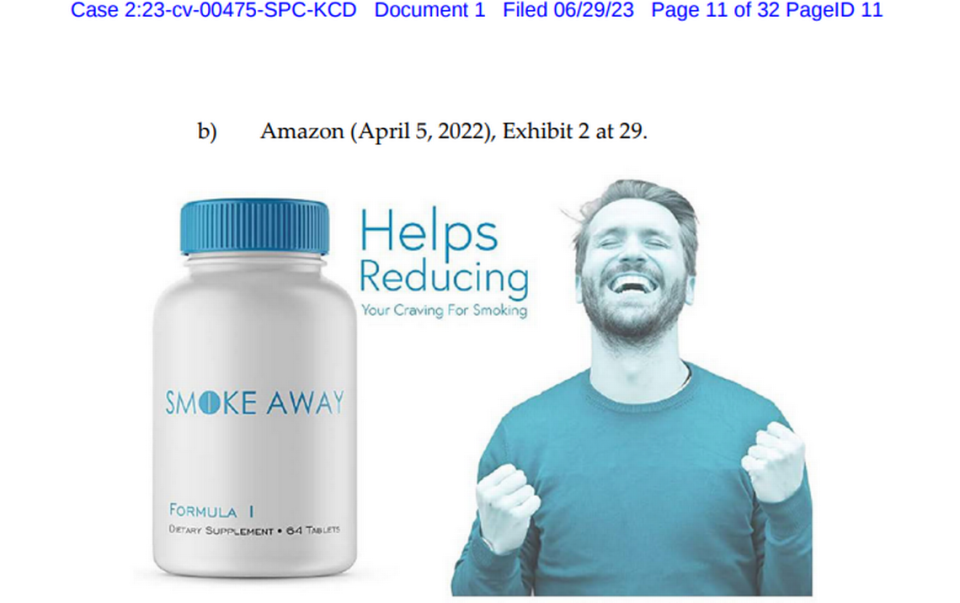Smokers hoping to quit were deceived by Florida companies, feds say. Now firms must pay
“Smoke Away” products were advertised and sold by Florida companies as the ultimate solution for smokers looking to end nicotine cravings and smoking habits, federal prosecutors said.
In reality, the companies were deceiving consumers across the U.S. through widespread marketing campaigns involving false promises and testimonials featuring paid actors, according to the Department of Justice.
Smoke Away tablets, homeopathic sprays, pellets and kits — sold on retail websites such as Amazon, Walmart and eBay — were advertised as a safe and effective way to help smokers curb their addiction within a week, according to a complaint filed in federal court in the Middle District of Florida in late June.

The products were promoted on Google, on social media platforms including Facebook and YouTube, over the radio and through recorded, misleading testimonials, the complaint says.
“I was losing friends — nobody liked me. Until I found Smoke Away,” one paid actor said in a testimonial, according to the complaint.
“I tried everything — the patch, the gum. You name it, I tried it. And nothing worked until I found Smoke Away. Now I have more friends. I smell good. Food tastes better…”
Smoke Away distributor Michael J. Connors and his companies’ claims about the products were not backed up by scientific evidence, according to prosecutors.
On July 31, a federal judge ordered Connors and the companies to pay $7,146,046 in consumer redress and a $500,000 civil penalty after prosecutors accused them of violating the the Opioid Addiction Recovery Fraud Prevention Act of 2018 and the Federal Trade Commission (FTC) Act, the Justice Department announced in a news release.
His companies, according to prosecutors, include:
ProTouch Marketing LLC, doing business as Smart Day Supplements based in Naples
Woodford Hills LLC based in Naples
Oakhill Research LLC based in Fort Myers
Evergreen Marketing LLC based in Naples
Sterling Health LLC based in Naples
Clara Vista Media LLC based in Naples
McClatchy News contacted an attorney representing Connors and the companies for comment on Aug. 1 and didn’t receive an immediate response.
“Those struggling with alcohol, tobacco, or drugs deserve help and support, not phony promises, and we will continue to hold accountable those who prey on addiction sufferers,” Samuel Levine, the director of the FTC’s Bureau of Consumer Protection, said in a statement.
Connors is accused of being a repeat offender when it comes to advertising Smoke Away products, according to the release.
In 2005, Connors settled accusations involving one of his former companies and the advertising of Smoke Away products by entering into a settlement agreement with the FTC, according to prosecutors.
“Connors nevertheless continued to violate the FTC Act with unsubstantiated health claims about Smoke Away products,” prosecutors said.
Under the FTC Act, false or deceptive advertising to sway consumers into purchasing food, drugs, devices, services or cosmetics is illegal, according to the complaint.
Connors and his companies also violated the Opioid Addiction Recovery Fraud Prevention Act, according to prosecutors, by marketing Smoke Away products “as a substance use disorder treatment product,” the complaint says.
Now, he can no longer advertise, market, sell, promote, distribute or offer substance use disorder treatment products and is banned from making false product claims in the future as part of a stipulated order entered by the court, according to the release.
In addition to this, Connor must engage in recordkeeping and reporting requirements for 20 years so officials can ensure he’s complying with the FTC Act and the Opioid Addiction Recovery Fraud Prevention Act, prosecutors said.
Simply Orange Juice’s drink isn’t ‘all-natural’ and has ‘toxic’ ingredients, suit says
‘Dangerously defective’ pistol fires even if you don’t touch the trigger, lawsuit says
Texas Pete hot sauce is ‘deceptive’ because it’s made in North Carolina, lawsuit says

